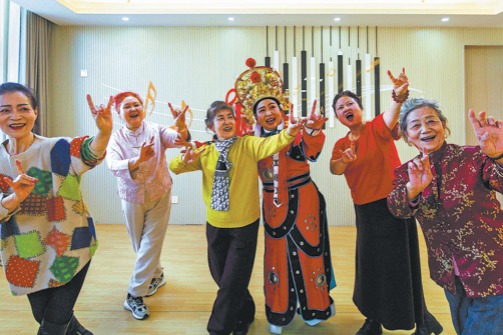Gallerist brings Uruguayan art to Beijing
By Yang Xiaoyu | chinadaily.com.cn | Updated: 2024-08-28 17:16

Uruguayan contemporary art is known for Constructive Universalism, an art theory in which simplified universal symbols, including references to pre-Columbian cultures, were set within grids proportioned according to the Golden Section. The theory was advocated by internationally renowned Uruguayan artist Joaquíoaquet wiGarcía (1874-1949), who established the School of the South, a workshop in which he encouraged students to seek inspiration locally rather than globally, while at the same time establishing an autonomous artistic tradition, according to Saravia.
"Many artists follow certain guidelines of that school and develop their works based on the golden ratio. The capacity for creation is infinite and in a country of only 3.4 million inhabitants there are many creative artists and craftsmen," noted the veteran gallerist.
"Through some international fairs, I can affirm that the works of the artists we exhibit are always of the highest quality compared with other galleries," she emphasized.
To increase the visibility of Uruguayan art, her gallery has been regularly participating in local and global art fairs such as Pinta Miami in the United States; Art Lima in Peru; JustMAD in Madrid, Spain; and ESTE ARTE in Punta del Este, Uruguay.
In the meantime, the Uruguayan curator and gallerist has been committed to promoting her country's contemporary art in China.

In 2016, the Diana Saravia Gallery sent nearly 20 works by six Uruguayan artists to the Uruguayan Embassy in China. In the following years, those works were exhibited in Chongqing, Dalian, Yulin, Zaozhuang, Taiyuan and other Chinese cities, ensuring that China-Uruguay cultural exchanges were not interrupted during the pandemic.
Her visit to Beijing to organize Presto's exhibition this month marks her first trip to China.
"It is really amazing how beautiful everything is. I am surprised at every step. The flowers, the greenery, the beauty and aesthetics in the buildings, and the spaces within the city. The temples, their history and the care they take of them. There is a lot of love (among Chinese people) for their traditions and past," she said.
The Uruguayan gallerist said her visits to the Uruguayan Art Space and the Central Academy of Fine Arts made her surprised by the production and quality of contemporary artwork in Beijing and she found Chinese calligraphy as an interesting technique.
"I think we should generate good art exchanges. We speak different languages but the plastic language is very compatible," she concluded.
- Ink artist activates the motion of strokes to echo predecessor master’s brushwork spirit
- Uruguayan artists bring works to Beijing
- Food festival celebrates Uruguay’s 35 yrs of ties with China
- Uruguayan photographer captures free-spirited gauchos
- China, Latin America celebrate ties through exhibition
- Living and breathing tango
























